- Grew up on a family farm and was involved with 4-H and FFA.
- Obtained bachelor’s degree in agriculture education with a minor in animal science.
- Worked for a few veterinarians.
- Began working with Natural Resources Conservation Service as a soil and resource conservationist.
- Purchased farmland with her husband.
Obtaining and purchasing land:
“We were always looking at land for sale. I also maintained a baseline of current land value. I saw a ‘for sale’ sign when driving home one day, and decided to go the extra mile out of the way to check it out. As a result of working in the same county for 15 years, I have come to know and develop great relationships with local realtors and farmers. I called the realtor to make an offer. My offer sat for a few months, and eventually the landowner responded with a counter offer.”
Importance of farming:
“Everything about farming encompasses what we want our kids to learn and take with them as they grow. Farming requires you to have your finances in order, including planning both financially and conceptually. In addition, value-added traits come with experiences on the farm, which leads to good work ethic, efficiency, honor, and trust.”
Plans for farmland:
“We recently purchased a small piece of cropland, where we will start with a corn and soybean rotation. We also have a small area of hayland, which we hayed and sold the hay to the neighbors.”
Advice for others:
“Taking risks are important to achieving success. Farming has so many opportunities and opens doors to agencies, industries, organizations, and people you would have never known existed.”
Extra opportunity:
“I started a side business of woody florals as décor, and since have included new plantings of woody floral, nut, and berry species around our home. This opened up an opportunity to work with the Natural Resources Conservation Service and enroll in the Conservation Stewardship Program, which allows us to continue to implement new plantings of trees, shrubs, and pollinator areas, as well as develop a plan for improving existing areas for wildlife habitat.”
Markets we sell to:
“For the conventional farm, we will sell to the local grain elevator. For nontraditional items (woody florals and hay), I sell by word of mouth and at local craft fairs and trade shows.”
This case study is designed to provide new and beginning farmers and ranchers with relevant information to initiate, improve, and run agricultural operations. This case study is funded by a U.S. Department of Agriculture Beginning Farmer and Rancher grant.


